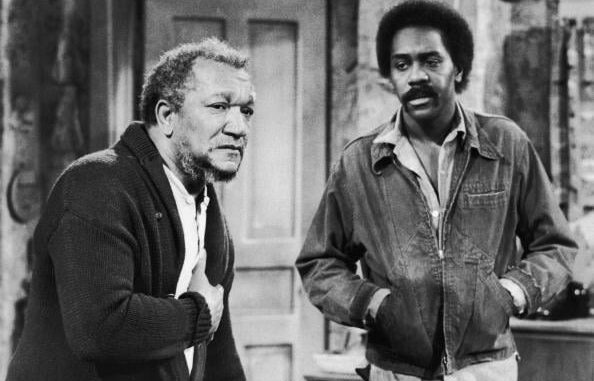
When Demond Wilson heard that Redd Foxx would star in a television sitcom, the actor dismissed it as a joke.
Foxx was a killer stand-up comic, with a signature profanity that Wilson said was little of a departure for the timid networks that were television in 1972. That was before television Cable and the development of streaming services are still decades away.
“It’s like bringing a dog to a cat party,” Wilson described the concept of Foxx invading TV in a recent Associated Press interview.
But the comedian has perfected his role on the small screen, and Sanford and Son, starring Wilson as Foxx’s beleaguered adult son, debuted 50 years ago on NBC in September. This. An instant ratings breakthrough, it opened the door for other Black family shows to enter the nearly all-white television landscape.
Norman Lear, who stirred up the network a year ago with the CBS sitcom “All in the Family,” said serendipity led to “Sanford and Son.” Lear and Bud Yorkin, his producing partner, were in Las Vegas when they saw a lounge show featuring Foxx.
“We met with him and went back to LA in the sky” about creating a Foxx-centric sitcom, Lear said in an email exchange. “Miraculously, a few days later, a British agent, Beryl (Vertue) came to us with the idea of creating an American version of a British hit called ‘Steptoe and Son’. “
“It was an instant marriage,” Lear said, and he said Foxx did not object.
“Not that he wasn’t difficult to deal with, but he was very funny and that made anything possible,” Lear said. Foxx, who died in 1991 at age 68, skipped part of the season due to a contract dispute with producers.
“Sanford and Son,” which aired from 1972-77, revolved around widower Fred Sanford, a tough trash dealer in the Watts section of L.A. who forced his long-suffering son to work and insult him. mine, Lamont. Among them: “You idiot!” has become a catchphrase of the show.
Wilson, a Vietnam veteran who has appeared on stage in New York, in films and on television, was approached about the series after his “All in the Family” guest role. Wilson also learned that producers had another possibility in mind to play Lamont.
Wilson, a Vietnam veteran who has appeared on stage in New York, in films and on television, was approached about the series after his “All in the Family” guest role. Wilson also learned that producers had another possibility in mind to play Lamont.
“Sanford and Son” introduces viewers to other talented actors and comics often dismissed by Hollywood because of their race, including cast member LaWanda Page as Aunt Esther; Whitman Mayo as Grady Wilson; Don Bexley as Bubba and Lynn Hamilton as Donna, Foxx’s kind-hearted girlfriend.
Slappy White, who worked on comedy with Foxx, occasionally appeared on the series, as did Pat Morita, who would come to fame in the future “The Karate Kid” movie, whose character name, Ah Chew, and his ethnicity was a highlight for Fred.

“Sanford and Son” introduces viewers to other talented actors and comics often dismissed by Hollywood because of their race, including cast member LaWanda Page as Aunt Esther; Whitman Mayo as Grady Wilson; Don Bexley as Bubba and Lynn Hamilton as Donna, Foxx’s kind-hearted girlfriend.
Slappy White, who worked on comedy with Foxx, occasionally appeared on the series, as did Pat Morita, who would come to fame in the future “The Karate Kid” movie, whose character name, Ah Chew, and his ethnicity was a highlight for Fred.
“Yes. We’re not comparing (“All in the Family” and “Sanford and Son”), but the characters call it like they saw it in their own neighborhoods,” Lear said in an email.
The show started other sitcoms about working-class black families, including “Good Times,” which also starred Lear and starred Esther Rolle and John Amos, and the movie Less successful was “What’s Happening!!” from Yorkin, who passed away in 2015. (“The Jeffersons” by Lear very rarely features a wealthy black couple.)
While black audiences finally got to see versions of themselves on screen, it was mostly limited to people in struggling neighborhoods and was created by producers, writers, and writers. The playwrights and directors were almost uniformly white at the behest of white executives.
That’s in stark contrast to 21st-century comedies created and directed by Black writers, producers and actors, including ABC’s “black-ish,” HBO’s “Insecure.” and FX’s “Atlanta,” as well as their sweeping and nuanced perspectives on black life.
Eric Deggans, television critic for National Public Radio, finds a “double-edged quality” to the older generation of sitcoms. They introduced performers who were popular with black audiences and, starting with “Sanford and Son,” proved that a series about a black family could be widely successful.
The comedies are also honest in their depiction of some of the real-life challenges of Black people, Deggans said. But in the end they relied on racial stereotypes and settled on laughter.
Deggans said the shows made poor areas “look more livable and even fun, as opposed to the problems they actually face”.